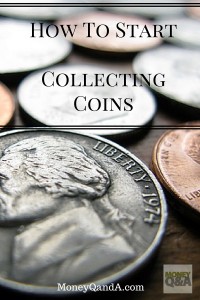The following is a guest post. If you would like to write an article for Money Q&A, please visit our Guest Posting Guidelines page and then send me an email.

If the answer is yes, then coin collecting might be perfect for you. So, the question is, would it be practical to embrace such a hobby?
Would coin collecting be valuable once you hit your golden years? The answer is yes, and we’d bet a bottom silver dollar on it. Here’s why.
History of Coin Collecting
Coin collecting is very popular nowadays. In fact, a lot of collectors buy and collect coins for personal pleasure and enjoyment, but there are those who also see it as an investment.
In ancient times, coin collecting was a hobby that only appealed to royalty, and was known as the “Hobby of Kings”. Around the 14th century, coin collecting became seemingly popular and records of coin collecting began to mark history in numismatics. It wasn’t until the 19th century that coin collecting spread to other social classes.
Today, coin collecting is more systematized and extremely accessible. There are coin conventions almost anywhere you go, as well as a number of numismatic organizations to join.
Begin With Pocket Change
There are several levels of coin collecting. To start, here are some of the oldest coins that are worth more than the face value and could be in your pocket change.
Old Lincoln Wheat Pennies
These are made from 1909-1958, and are still in circulation, but becoming scarce in pocket change as the days pass by. Wherein, the Lincoln wheat cent made before ’34 are considered to be the scarcest.
Buffalo Nickels
Yes, believe it or not, you can still find this in pocket change. However, do keep in mind that they’re extremely rare in circulation nowadays. Some say that the Buffalo nickel turns up once in every 25,000 nickels.
Pre-1982 Lincoln Memorial Copper Pennies
All pennies made before the year 1982, except for the ’43 steel penny were made using copper.
Copper is one of the most valuable metals and that’s why the ’82 pennies are worth more than its face value. Also, most Lincoln pennies made since ’82 are made from zinc.
Silver Coins
There are types of silver coins that are still circulating today, and one of the most common is the silver Washington quarters with dates from 1932-1964 and silver Roosevelt dimes with dates from 1946-1964.
What Are Junk Coins
In the US “junk coins” is the informal term used to describe the coins used in the US, UK, Australia, and Canada that are made of silver. These coins are in fair condition but has no collectible value above the bullion value of the silver it has.
These coins are popular to people who are interested in investing in silver but in small amounts. The junk refers to the value of the coins because they’re not collectible, but the silver in them are.
Coins With Errors
The value of the coin is not just in the artistic beauty, age, or history. It can also be in the rareness of errors. For instance, the 2009 Abe Lincoln Formative series has Abe Lincoln as a rail-splitter with six fingers. An error like this is worth significantly more than just one cent.
Final Thought
Who knows, your piggy bank might be harboring a national treasure with coins that are very valuable by now.
The biggest mistake a lot of people make is putting a quarter in a candy machine, not realizing that they’re paying $200 for a piece of gum! That’s why it’s very important for novice collectors to buy a collector’s guide that would help them determine and familiarize themselves with the true value of coins.
Are you a coin collector? Do you know how to start collecting coins? How did you start your coin collecting hobby? Was it through your pocket change?
If you would like to write an article for Money Q&A, please visit our Guest Posting Guidelines page.
original photo courtesy of frankieleon/flickr
